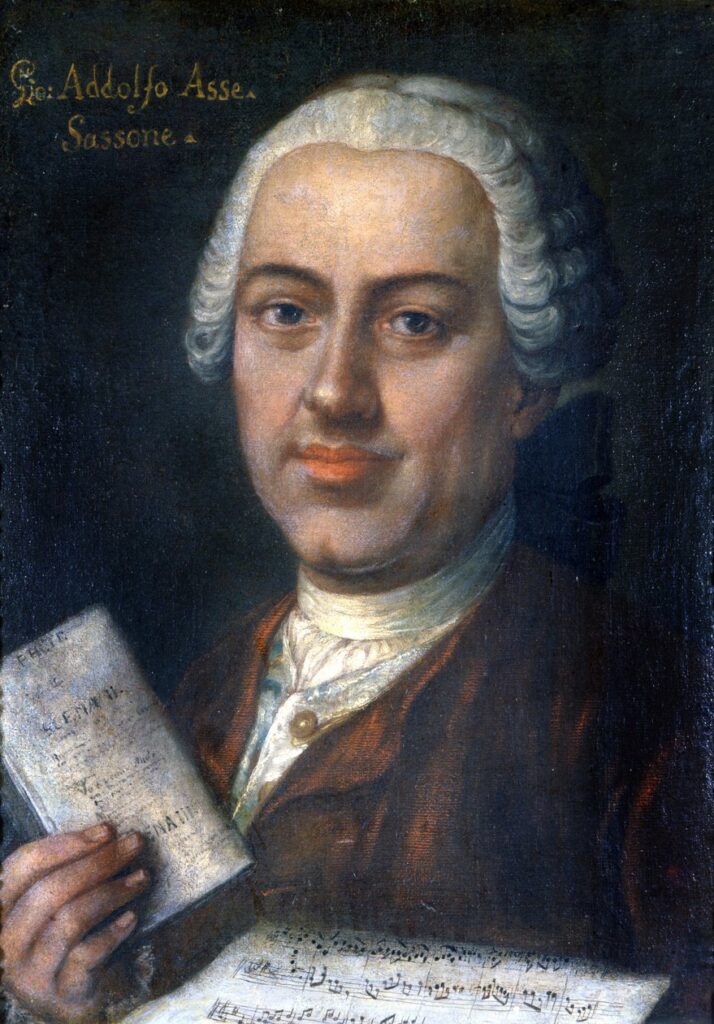
Ritratto di Johann Adolf Hasse.

Ritratto di Johann Adolf Hasse.
Sanctus Petrus et Sancta Maria Magdalena
Johann Adolf Hasse at the Ospitale degli Incurabili (1758)
Early Music Seminars Egida Sartori and Laura Alvini
Director: Pedro Memelsdorff
Master classes and lectures by Vivica Genaux and Raffaele Mellace
Venice, Giorgio Cini Foundation, November 25-29, 2024
Concert
Auditorium “Lo Squero”, Venice, November 28, h. 18 | Free entrance until seats last
Singers and musicians:
Jin Sophia, soprano
Ott Polly, soprano
Yuneeva Sofya, mezzoprano
Danta Maximiliano, countertenor
Cravino Raquel, violin
Gérard Stefano, violin
Cho Choi Hyngun, cello
Dijoux Jean-Christophe, organ and harpsicord
Just as in the other Venetian hospitals ‒ ‘dei Derelitti’, ‘dei Mendicanti’ or ‘della Pietà’ ‒ also in that ‘degli Incurabili’ the extreme importance given to music education in the seventeenth and eighteenth century is proportioned to the renown of the composers engaged to teach and direct public performances. These included great names such as Pallavicino, Porpora, Jomelli, Galuppi and ‒ perhaps the most famous among them all ‒ Johann Adolf Hasse.
Hasse composed two large motets on the fiftieth psalm Miserere mei Deus (one in C and one in D minor) for the ‘Incurables’’s ‘pute’ (maidens), to be performed during the celebrations of the Holy Week in the hospital church, consecrated to the Holy Saviour. And by way of introduction for each of them, he also composed two oratorios: Serpentes in deserto (introduction of the Miserere in C) and Sanctus Petrus et Sancta Maria Magdalena (introduction of the Miserere in D). Their function was didactic-moral: to exhort the girls and their audience to compassion, that is, identification with the utmost sorrow, as a prelude to the de profundis expressed by the subsequent penitential psalm.
The seminar will focus on one of those oratorios, Sanctus Petrus et Sancta Magdalena, composed for the ‘pute’ in 1758. Its poetic interest lies mainly in the narrative’s perspective: the Passion of Jesus seen not only by Peter and Magdalene, but also by three ‘minor’ characters in the Gospels ‒ Mary the mother of James, Salome, and Joseph of Arimathea. Its musical interest, conversely, resides in the variety and intensity of rhetorical structures and figures with which Hasse enriches and indeed exacerbates that narrative.
The seminar’s main teacher will be mezzo-soprano Vivica Genaux, a celebrated specialist in the Hassian repertoire, who will be assisted by Raffaele Mellace, one of the leading musicologists in the field. As traditionally, the seminar will be concluded with a public concert.
The event is organized with the contribution of the Regione Veneto and the Swiss foundations Concordance,Irma Merk and L.+Th. La Roche, and the Johann Adolf Hasse Foundation (Hamburg).
Scholarships available for singers and musicians (violin and continuo players)
Application deadline: 8th October, 2024

Ritratto di Johann Adolf Hasse.